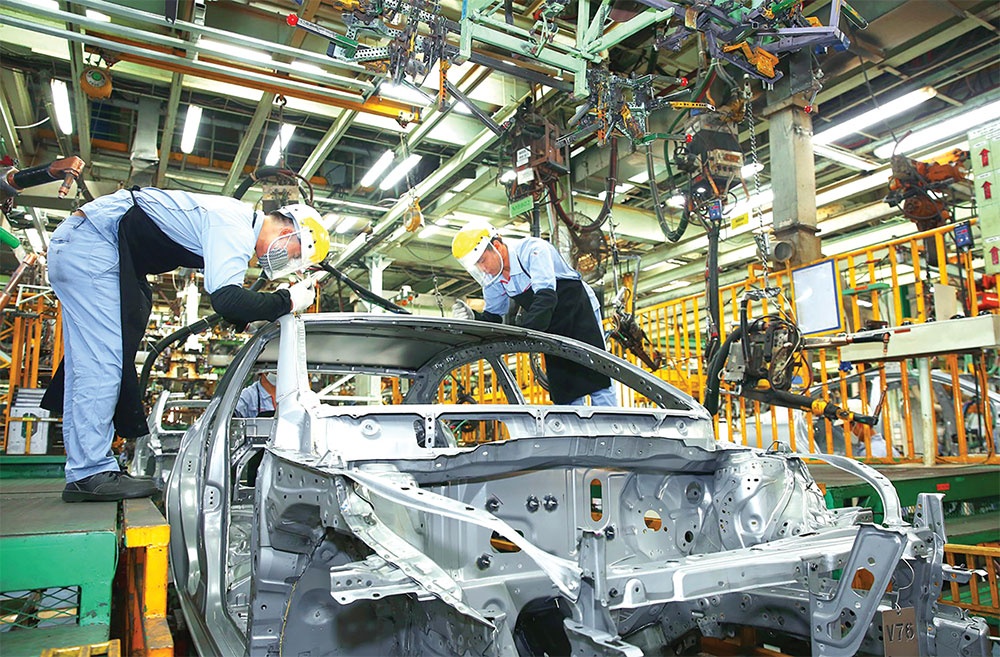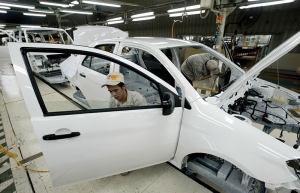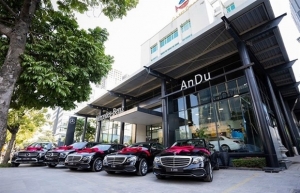Fairness cited for fee adjustment proposal
 |
| Vietnam has to balance the differences in imports that are already fully built and those assembled here, Photo: Le Toan |
After industry leaders and local associations asked the Vietnamese government to extend the payment of excise tax and reduce the registration fee of domestically manufactured and assembled cars by 50 per cent, the Association of Vehicle Importers Vietnam (VIVA) has also proposed the same move for completely built up (CBU) imported cars.
According to the association, which includes members such as Audi, Bentley, Ferrari, Maserati, Subaru, Volkswagen, and Volvo, businesses are struggling to cope with high inventories due to the sudden decrease in purchasing power in the market. In addition, the situation of excess vehicles is aggravated by the recent registration difficulties.
Earlier, the government twice approved a 50 per cent reduction in registration fees for domestically manufactured and assembled cars. On both of those occasions, the market recovered and became active again, and auto sales increased sharply and maintained growth momentum until the end of 2022.
It is estimated that about 40 models of domestically assembled cars enjoyed a reduction in registration fee during the pandemic. But although businesses petitioned many times, they were still not allowed to apply the policy of reducing fees in advance to imported CBU vehicles. Therefore, VIVA has called for the same incentive to be applied for both domestically manufactured and assembled cars and imported cars in the name of fairness.
Economic expert Dinh Trong Thinh said that with the proposal to continue to extend the payment of special consumption tax and reduce the registration fee for cars, the authorities should consider it in a careful manner.
“In order to consider the appropriate reduction and extension, the government must balance the interests of businesses, the state, and consumers. In the immediate future, it is necessary to consider prioritising exemptions and reductions for some particularly difficult manufacturing industries first,” Thinh recommended.
According to Nguyen Thanh Ha, chairman of SBLaw, it is very unlikely that the proposal to reduce registration fees for imported cars will occur.
“Vietnam’s auto industry will face a large wave of imported cars from many other markets after our country becomes even more ingrained in free trade agreements, such as that with the EU, causing auto import taxes to gradually decrease to zero,” he explained.
Ha added that in nations similar to Vietnam’s status, domestic car manufacturing and assembly industries are inherently facing limitations compared to those in developed countries.
In Vietnam, many car manufacturers have domestic assembly plants but still import a large number from abroad. Currently, the difficulty for domestic manufacturers also lies in the ability to supply components when Vietnam’s supporting industry is still underdeveloped.
In 2022, the number of cars imported to Vietnam reached 176,590 units. The number of CBU cars from abroad also continuously increases each year. In the first two months of this year, 26,780 CBU cars worth more than $570 million were imported, up 96.1 per cent in quantity and 68.9 per cent in value over the same period last year.
According to the strategy for the development of Vietnam’s vehicle industry to 2025, the government aims to meet market demand, create motivation to promote the development of other industries, and improve competitiveness to become a supplier of components and spare parts for the world’s vehicle production chain.
Under the national strategy, the government prioritises resources and preferential policies for domestically manufactured and assembled cars. This helps the auto industry develop substantively, bringing economic efficiency to Vietnamese enterprises and foreign enterprises investing in Vietnam, and contributing to creating jobs for domestic workers.
 | Car sales up in air with end of fee cut The expiration of a registration fee cut for locally-assembled and manufactured cars, on top of parts shortages, caused a plunge in the sale of cars in June. |
 | Imported cars should be included in registration fee reduction scheme The 50 per cent registration fee reduction scheme, previously proposed by the Government for cars made and assembled in Vietnam, should apply to imported vehicles as well, according to the Vehicles Importers Vietnam Association (VIVA). |
What the stars mean:
★ Poor ★ ★ Promising ★★★ Good ★★★★ Very good ★★★★★ Exceptional
Related Contents
Latest News
More News
- Masan Consumer names new deputy CEO to drive foods and beverages growth (February 23, 2026 | 20:52)
- Myriad risks ahead, but ones Vietnam can confront (February 20, 2026 | 15:02)
- Vietnam making the leap into AI and semiconductors (February 20, 2026 | 09:37)
- Funding must be activated for semiconductor success (February 20, 2026 | 09:20)
- Resilience as new benchmark for smarter infrastructure (February 19, 2026 | 20:35)
- A golden time to shine within ASEAN (February 19, 2026 | 20:22)
- Vietnam’s pivotal year for advancing sustainability (February 19, 2026 | 08:44)
- Strengthening the core role of industry and trade (February 19, 2026 | 08:35)
- Future orientations for healthcare improvements (February 19, 2026 | 08:29)
- Infrastructure orientations suitable for a new chapter (February 19, 2026 | 08:15)

 Tag:
Tag:



















 Mobile Version
Mobile Version